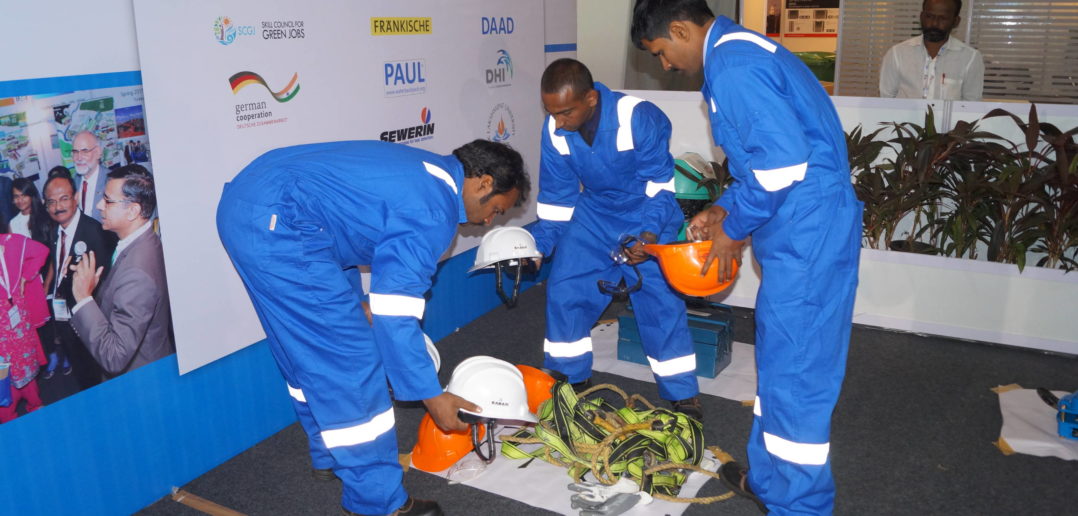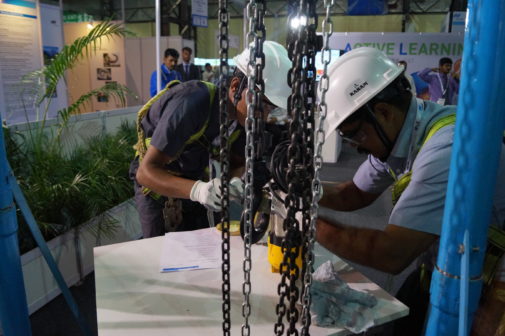In this guest article, Franziska Sophie Kohler and Tom Leslie Mikus, from Deutsche Gesellschaft für Internationale Zusammenarbeit (GIZ) GmbH, tell us how strategic training and skill development can create a positive impact in Sustainable Urban and Industrial Development. The article focuses on how systematically trained staff can reduce the operating and maintenance costs of their wastewater treatment plants in many companies and industrial parks. Let’s read on to know more about Sustainable and Environment-friendly Industrial Production (SEIP) and the role of training in its successful implementation.
The risks associated with India’s rapid industrial development include increasing pollution levels, overuse of natural resources, and increasing amounts of waste and wastewater, leading to endangerment of ecosystems and putting sustainable development at considerable risk. 150 river stretches and 43 industrial areas have already been classified as critically polluted by the Central Pollution Control Board way back in 2009.
Required by law, India’s industrial wastewater is treated by over 170 Common Effluent Treatment Plants (CETPs) in industrial parks and several thousand Effluent Treatment Plants (ETPs) installed at individual industries. Nevertheless, inadequate operation and management of these plants are still a main cause for the pollution of the surrounding environment and waterbodies in particular. Since there is no legal obligation to employ trained staff or to provide training these plants are usually run by untrained staff. Therefore, many water treatment plants are operated inefficiently and their positive effect towards the prevention of pollution is unnecessarily limited. Thus, great potential is wasted.

Advantages of professional training and skill development
- Professional training of the personnel operating CETPs and ETPs is particularly necessary to unlock this potential.
- Well-trained staff is able to maintain the wastewater treatment plants optimally and run them with maximum efficiency.
- The professional training of the staff and technicians operating wastewater treatment plants does not merely benefit the environment; it has a clear positive impact on the profitability of single companies with ETPs and companies located in industrial parks with CETPs as well as the water quality of close rivers and waterbodies.
At this point the project Sustainable and Environment-friendly Industrial Production (SEIP) takes up this issue. SEIP is a joint project of Deutsche Gesellschaft für Internationale Zusammenarbeit (GIZ) GmbH and the Indian Ministry of Environment, Forest and Climate Change (MoEFCC) within the framework of the Indo-German technical cooperation which focuses on sustainable development in industrial parks in India. Reducing the pollution of rivers and waterbodies located in the drainage area of associated industrial parks and companies by increasing the efficiency and functionality of wastewater treatment plants is one of SEIP project’s main objectives.
Training in Wastewater Management in collaboration with Skill Council for Green Jobs (SCGJ)
In cooperation with the Skill Council for Green Jobs (SCGJ) a market-oriented training system for staff operating wastewater treatment plants is under development. Several components, such as the development of qualification packages for wastewater treatment plant technicians and helpers and associated training material as well as a first round of Training-of-Trainers and a pilot training for operators, have already been achieved.
In the follow-up of the pilot training, several examples have demonstrated cost reductions achievable through the efficient operation of CETP and ETP systems with the help of professionally trained plant operators. After ETP operators of M/S Meenakshi Polymers Pvt. Ltd., a manufacturer of a diverse range of automotive and lifestyle products, had received training, they were able to detect that several adjustments and the regular monitoring of the wastewater would lead to great savings. Within three months, the monthly consumption of sodium bimetasulphate (SBMS) was reduced from 550kg to 200kg which equals a cost reduction from INR 15,950 to INR 6,200. Similarly, the company’s monthly consumption of caustic soda was reduced from 1,150kg to 450kg which equals a cost reduction from INR 55,200 to INR 21,600. ETP technicians of M/S Sarna Group participating in the pilot training described operational problems they had faced operating the ETP.
 Discussing these issues in the context of their training led to significant performance improvements of the company’s wastewater treatment plants. Due to insufficient settling of suspended solids and organic matter the ETP unit’s filter press was not working properly. Input attained at the training sessions enabled the technicians of M/S Sarna Group to adjust the filtering process accordingly. Now, drier solids entering the filter press decrease the load the filter press has to handle. This protects the filtering unit and since more sludge can be dried with less effort, power may be saved. These examples show that companies are able to cut their monthly expenses on maintenance and the consumption of chemicals and energy due to minor adjustments and measures accomplished by trained plant operating staff.
Discussing these issues in the context of their training led to significant performance improvements of the company’s wastewater treatment plants. Due to insufficient settling of suspended solids and organic matter the ETP unit’s filter press was not working properly. Input attained at the training sessions enabled the technicians of M/S Sarna Group to adjust the filtering process accordingly. Now, drier solids entering the filter press decrease the load the filter press has to handle. This protects the filtering unit and since more sludge can be dried with less effort, power may be saved. These examples show that companies are able to cut their monthly expenses on maintenance and the consumption of chemicals and energy due to minor adjustments and measures accomplished by trained plant operating staff.
Skill Competition in Wastewater Management
A yearly highlight in the promotion of skilling in the field of wastewater treatment is the Skill Competition at IFAT India in Mumbai. IFAT India is India’s leading environmental trade fair for water, sewage, refuse and recycling. With support of the German Association for Water, Wastewater and Waste (DWA), the competition provides trained teams of wastewater treatment plant operators to demonstrate their skills and expertise in the field of safety, maintenance and operation. It further offers companies a golden opportunity to express their environment orientation, concern for the safety of workers, as well as professionalism in operation of their plants.
About the authors
 Franziska Sophie Kohler holds degrees in Business Administration and Integrated Natural Resource Management. Since joining GIZ in 2013, she has mainly focused on the topics of renewable energy and sustainable industrial production.
Franziska Sophie Kohler holds degrees in Business Administration and Integrated Natural Resource Management. Since joining GIZ in 2013, she has mainly focused on the topics of renewable energy and sustainable industrial production.
 Tom Leslie Mikus is a student of Industrial Engineering and Management with special emphasis on energy engineering. Currently he is interning with GIZ India.
Tom Leslie Mikus is a student of Industrial Engineering and Management with special emphasis on energy engineering. Currently he is interning with GIZ India.












